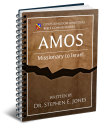Latest Posts
View the latest posts in an easy-to-read list format, with filtering options.

Amos was a missionary from Judah to Israel, giving them a final warning to repent before divine judgment was to destroy the nation. They refused, and two years later the nation was struck by a massive earthquake that destroyed their defenses and allowed the Assyrians to conquer them easily.
Category - Bible Commentaries

Chapter 7 brings us to Amos’ visions in regard to Israel’s condition and the judgment that God had decreed upon the nation. There are three back-to-back visions from Amos 7:1-9, followed by an account of the Bethel priests’ opposition and threats. Then there is one more vision in Amos 8:1-14 before the final conclusion of judgment and restoration in chapter 9.
Amos 7:1 says,
1 Thus the Lord God showed me, and behold, He was forming a locust-swarm when the spring crop began to sprout. And behold, the spring crop was after the king’s mowing.
This pictures locusts yet in the larvae stage of development. Amos says that God was forming them to bring judgment upon Israel. The vision shows God preparing to judge Israel. In this case the Assyrians were the locusts.
As for the setting of the vision itself, the locusts were pictured in the spring “after the king’s mowing.” The Wycliffe Bible Commentary says of this,
“The king’s mowings. The first cuttlings of grass were set aside to feed the king’s horses, before the people harvested the main crop.”
When the locusts came out of the ground, they began to devour all the vegetation. Locust invasions were common in those days and today as well. Amos 7:2 says,
2 And it came about, when it [the locust-swarm] had finished eating the vegetation of the land, that I said, “Lord God, please pardon! How can Jacob stand, for he is small?”
Amos was alarmed, for he understood that the locusts represented an invading army and that the people of Israel were “the vegetation of the land.” He also knew that the promise of God was to restore “Jacob,” but if all of the people were consumed by divine judgment, “how can Jacob stand”? That is, how could Jacob stand up again?
Then we read in Amos 7:3,
3 The Lord changed His mind [“repented,” KJV] about this. “It shall not be,” said the Lord.
In Mal. 3:6 God says, “I change not.” Heb. 13:8 says, “Jesus Christ is the same yesterday and today, yes and forever.” Even Balaam, the classic false prophet, prophesied in Num. 23:19,
19 God is not a man, that He should lie, nor a son of man, that He should repent. Has He said, and will He not do it? Or has He spoken, and will He not make it good?
Such expressions do not mean literally that God repents of wrong-doing. But He certainly has been known to change His course of action. We understand, of course, that even such changes were preplanned from the beginning, so it is not the same as a man changing his mind.
Prior to the flood of Noah, when man began to degenerate morally and spiritually, God said in Gen. 6:7, “I am sorry that I have made them.” It literally reads, “I repent for even making them.” Because God is the alpha and omega, knowing the beginning and the end, we must understand this within that context.
In the time of Moses, God threatened to destroy the whole nation of Israel and to rebuild it through Moses and his family (Num. 14:12). Moses reminded Him of His New Covenant promise to bring Israel into the land. What would the neighbors say?
Moses knew that God could not and would not do this, because He had already sworn an oath to Israel to bring them into the land. If Israel failed, it would show that God was unable to fulfill His oath. Moses told God in Num. 14:15, 16,
15 Now if Thou dost slay this people as one man, then the nations who have heard of Thy fame will say, 16 Because the Lord could not bring this people into the land which He promised them by oath, therefore He slaughtered them in the wilderness.
Moses understood that God had sworn an oath to do it, putting all the responsibility upon Himself to see to it that it was accomplished. Such is the nature of the New Covenant. The Old Covenant in Exodus 19:8 was man’s vow to God, which put the responsibility upon men. But other covenants were simply God’s promise, vow, or oath to men.
Hence, Moses appealed to God’s New Covenant oath, and God then changed his mind so completely that He revealed the ultimate scope of His oath. Num. 14:21 says,
21 but indeed, as I live, all the earth will be filled with the glory of the Lord.
In other words, God says, not only will I bring Israel into this land, but in the end the whole earth will be filled with the glory of God. All mankind will come into the Kingdom. That is the scope of God’s oath, and this is consistent with the covenant made previously with Noah (Gen. 9:16) and later with Moses (Deut. 29:10-15).
God was testing Moses himself in this exchange. But Moses already had the revelation of the New Covenant and how God makes promises and oaths that He must keep. So here God gave Moses the opportunity to appeal to the New Covenant in order to fulfill the divine plan. God’s apparent frustration was an opportunity to give revelation.
By the will of God, as defined in the law (Rom. 2:18), God might have destroyed Israel. But by the plan of God, He had made an oath to save them, and this made God responsible to do whatever it took to fulfill His oath.
God will certainly fulfill all of His promises, although not without judgment. Hence, Israel spent 40 years in the wilderness, and their children entered the land under Joshua only after God made a second covenant with them in the plains of Moab (Deut. 29:1). This second covenant was another expression of the New Covenant, for it was another oath taken by God Himself (Deut. 29:12).
God again seemed to repent in 1 Sam. 15:35,
35 And Samuel did not see Saul again until the day of his death; for Samuel grieved over Saul. And the Lord regretted that He had made Saul king over Israel.
Of course, we know that God gave Saul to Israel as their king as judgment against those who demanded an earthly king to rule over them. God was not taken by surprise when Saul usurped the throne for himself. His rebellious actions were part of the divine judgment upon the nation. God had judged Israel by answering their prayer.
So we must understand that when God repents, or changes His mind, or seems to have regrets, He is not acting as men do. God is still God, and He knows the end from the beginning. Our sovereign God drew up the plan before He created the universe, and that plan included good times and bad. It also included times when He would go in one direction, only to change course later.
In the story of Jonah we read of another time when God seemed to change His mind. God had told Jonah to preach the message to Nineveh, “Yet forty days and Nineveh will be overthrown” (Jonah 3:4).
The people of Nineveh believed that God might change His mind if they repented. They said in Jonah 3:9,
9 Who knows, God may turn and relent, and withdraw His burning anger so that we shall not perish?
No one at that time understood that Jonah was called to reveal (by his life and work) the divine plan for the restoration of all things. So it had to appear as if Nineveh would be judged and destroyed. And indeed, the judgment of the law would have destroyed Nineveh.
But God had another plan that was based on His New Covenant oath to save the whole earth and all mankind. So He worked in the hearts of the people to cause them to repent, so that the results of God’s oath might be revealed in them.
It was not unusual for God to change His mind. But we must understand that even if His will changes according to men’s repentance, His plan does not change. His plan fully encompasses His will. If God changes, you can be sure that He planned to change His mind from the beginning.
Such is the nature of our unchanging God.